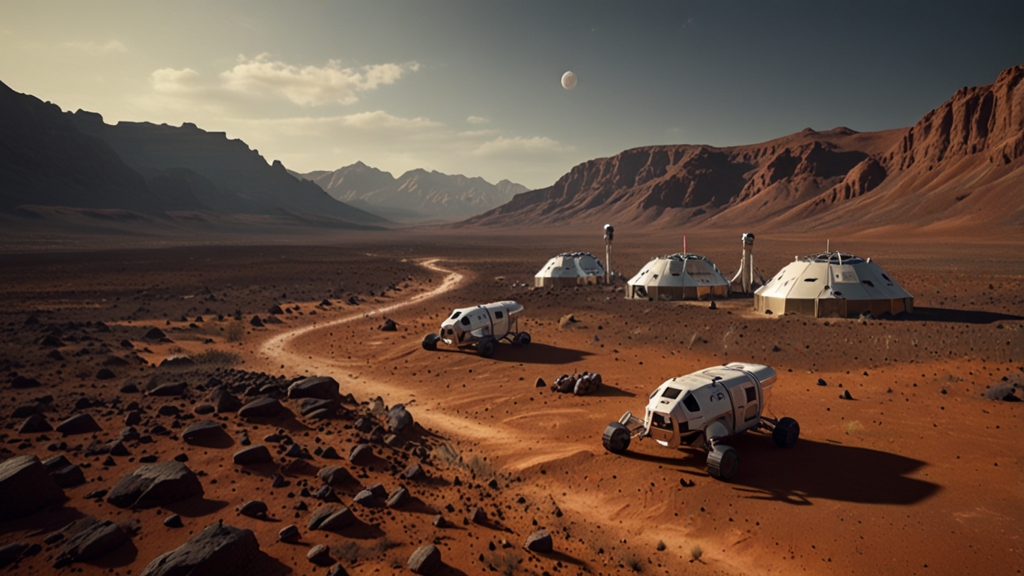Mars Colonization: The Next Giant Leap for Mankind
Humanity has always been captivated by the cosmos, dreaming of exploring and inhabiting distant worlds. This vision of space exploration is no longer confined to the realm of science fiction. As our technological capabilities advance, the quest to colonize Mars is rapidly transforming from a grand aspiration to a tangible goal. The effort to establish a human presence on Mars represents the next giant leap for mankind, promising a new era of exploration, innovation, and survival.
The Case for Mars Colonization
Mars, often called the "Red Planet," has long piqued the curiosity of scientists and dreamers alike. Its relatively close proximity to Earth and intriguing similarities make it a prime candidate for human colonization. Unlike other celestial bodies, Mars has a day length similar to Earth's, as well as polar ice caps, weather patterns, and seasons. These attributes provide a foundation upon which we can build a viable off-world colony.
“Mars is the next logical step in our space exploration journey. It's a natural progression for a species that started with fire and the wheel, progressed to the internal combustion engine, and then to the digital age. Space is our final frontier.”
— Dr. Michelle Thompson, Astrobiologist
Moreover, the colonization of Mars would serve as a monumental insurance policy for the human race. With the growing threats of climate change, overpopulation, and potential global conflicts, establishing a self-sustaining human presence on another planet could safeguard our species from existential risks. It opens up the possibility of a backup civilization that can continue the legacy of human ingenuity and culture.
Technological Advances and Challenges
While the vision of Mars colonization is compelling, turning this vision into reality involves unprecedented challenges. The journey to Mars and the establishment of a colony requires innovative advancements in various fields, including propulsion systems, life-support systems, and sustainable living technologies.
Space agencies like NASA, SpaceX, and other international partners have been making significant strides toward this goal. SpaceX, led by Elon Musk, has been at the forefront with its Starship project, designed to transport large numbers of people and cargo to Mars. This reusable spacecraft aims to reduce the cost of interplanetary travel, potentially making Mars colonization more economically feasible.
“SpaceX’s mission is to make life multiplanetary. We are focused on building the technology that will allow humans to not only travel to Mars but to live and thrive there.”
— Elon Musk, CEO of SpaceX
Life on the Red Planet
Building a sustainable colony on Mars will require solutions to a myriad of challenges such as radiation exposure, extreme temperatures, and limited resources. Innovations in habitat construction are crucial; scientists are exploring the use of in-situ resource utilization (ISRU) to produce building materials, water, and oxygen from Martian resources. Growing food on Mars is another critical aspect, necessitating advances in controlled-environment agriculture to support a stable food supply.
Human health and psychological well-being are also paramount. The isolation and confinement associated with a Mars mission pose significant mental health challenges. Comprehensive training, robust support systems, and effective communication with Earth will be essential to maintain the well-being of Martian settlers.
International Collaboration and Ethical Considerations
Colonizing Mars is not just a scientific and technological endeavor but also a profoundly political and ethical one. International collaboration will be vital, drawing upon the collective expertise and resources of nations worldwide. Establishing protocols for the responsible utilization of Martian resources and the preservation of potential Martian ecosystems is imperative. Ethical considerations must guide our actions, ensuring that Mars colonization benefits humanity as a whole and respects the intrinsic value of our neighboring planet.
“The colonization of Mars offers a unique opportunity for humanity to unite for a common purpose. It challenges us to think beyond national boundaries and to consider the legacy we want to leave for future generations.”
— Dr. Sarah Hudson, Space Policy Expert
A Vision for the Future
Mars colonization represents a bold leap into the unknown, embodying the indomitable spirit of exploration that defines humanity. As we stand on the precipice of this new frontier, the potential for discovery, growth, and innovation is boundless. The endeavor to colonize Mars will not only expand our horizons but also inspire generations to come, proving that when guided by curiosity and determination, there are no limits to what we can achieve. The next giant leap for mankind awaits—on the red sands of Mars.











